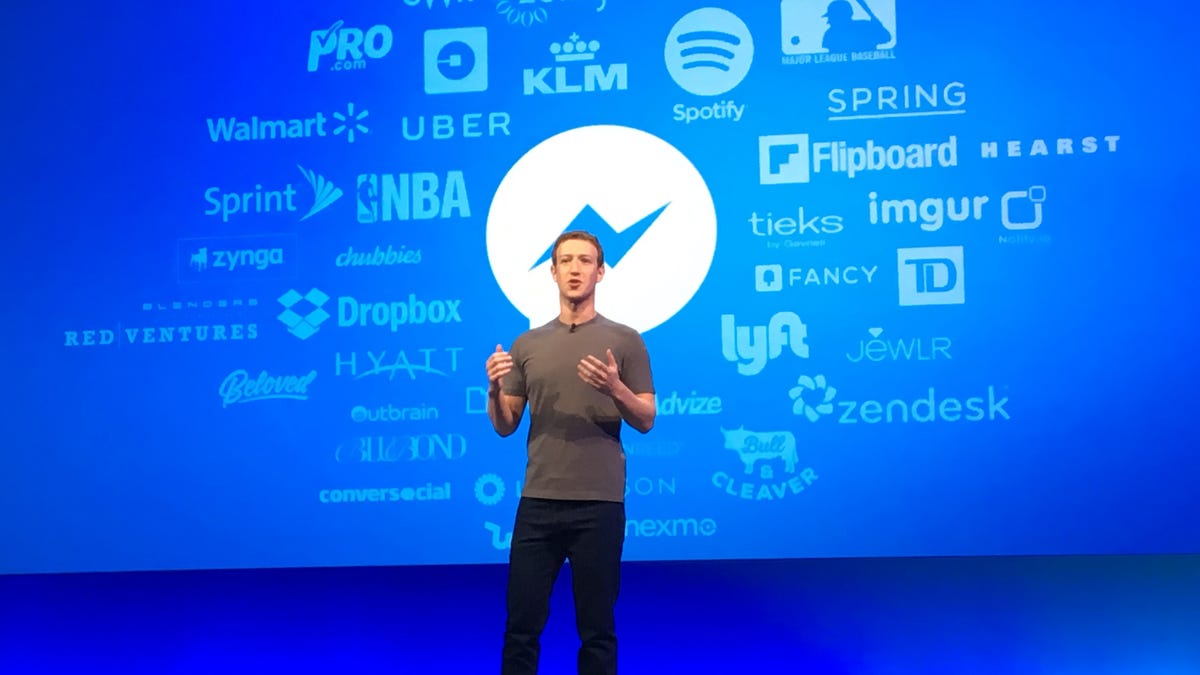Facebook Messenger wants to lure shoppers with augmented reality
At F8, Facebook adds new language translation and AI features for business owners to its chat app. The goal: Getting people to buy stuff on its platform.

Facebook is trying to make Messenger into a destination for shopping.
Facebook not only wants you to trust it with your personal data, it also wants to turn its Messenger chat app into your go-to shopping destination.
The social network is adding new features it hopes will convince its 1 billion Messenger users to turn to the platform as a retail hub. The new features include augmented reality experiences, automatic language translations and artificial intelligence tools that make it easier for small businesses to communicate with customers.
Facebook announced the new features Tuesday, during the company's annual F8 developer conference in San Jose, California.
Facebook is opening up Messenger to new AR experiences. A partnership with Nike lets people see new shoe releases.
Augmented reality, more commonly referred to as AR, lets you see digital graphics overlaid on images viewed through your phone's camera lens. For shopping, that means getting a closer look at a product without having the physical item in front of you.
Through a new partnership with Nike, for example, you'll be able to see a 3D model of new sneakers up close and also be able to rotate the shoes so that you can zoom in on different details. The same thing goes for a partnership with carmaker Kia. Another partnership with consumer device maker Asus aims to let people virtually "unbox" a phone, so they can examine the "hardware" up close before buying it.
Asus will let people virtually "unbox" new phones.
And in a deal with the makeup company Sephora, you'll be able to "try on" different shades and colors and see how they look on you. The demo appears to work like Snapchat and Instagram filters, which can give you rosy cheeks, a dog nose or flower crown.
"If you're a brand, how do you put the product into someone's hand without actually doing it?" said Stan Chudnovsky, head of Messenger Product, in an interview last week at Facebook headquarters in Menlo Park, California. "This is the closest way."
Two years ago at F8, Facebook announced it was opening up Messenger to chatbots, AI-powered software that can perform simple tasks: composing an email, booking travel plans or helping with customer support. Facebook now says there are more than 300,000 active bots on Messenger, up from 100,000 last year, and that 8 billion messages are sent between people and businesses each month on Messenger.
The AR news isn't a big surprise since Facebook has been making investments in augmented reality over the past few years. Last year at F8, CEO Mark Zuckerberg introduced Facebook Camera, a platform for third-party developers to make AR games and apps for the social network. Zuckerberg also unveiled what he said was the first large-scale piece of AR art, commissioned by the company to be displayed at Facebook headquarters. (You need a special app on your phone to see it.)
Also on stage last year, Michael Abrash, chief scientist of Facebook-owned VR company Oculus, laid out a compelling vision for AR glasses that could tell you if your kid has a fever, give you access to your entire workspace while you're on a flight or mute the background noise when you want to focus on hearing just the person you're talking to. Asked later if Facebook is actively building a pair of AR glasses, Facebook CTO Mike Schroepfer told CNET unequivocally: "Yes."
Sephora lets you digitally "try on" different makeup products.
But Facebook isn't the only tech giant betting on AR. Google and Apple have ARCore and ARKit, respectively, sets of developer tools that let software makers build AR experiences for Android phones and iPhones. And last week, CNET reported that Apple is working on a combination virtual reality and augmented reality headset slated for 2020.
'We're looking through everything'
Facebook Messenger is doing other things to try to help businesses, buyers and sellers on the platform.
On Tuesday, Facebook also announced automatic translations for Facebook Marketplace, the social network's version of Craigslist and EBay. If you're trying to buy something in the US, the service automatically opens up a Messenger thread so you can communicate with the seller. But if the seller responds in Spanish, Facebook's M assistant will translate the message to English. (Same happens vice versa if your default language is Spanish.) For now, it only works in Spanish and English, but the company said other languages are coming.
Lastly, Messenger is also trying to help small businesses connect with customers. The company introduced a feature that lets brands build auto replies for frequently asked questions. For example, if a customer messages a business asking if it's open today, Facebook's "natural language processing" software can understand the question and reply with the business's operating hours. The software will also reply to similar questions, like "When are you open?" or "What are your hours?" and send the same response.
Facebook Messenger will automatically translate conversations.
Facebook is making these changes to Messenger at a time when Zuckerberg and company are still under intense scrutiny after a scandal last month involving Cambridge Analytica, a digital consultancy that improperly accessed personal data on up to 87 million Facebook users without their permission. That scandal has prompted questions about how the social network handles data about its 2.2 billion users and whether Facebook can be trusted to protect that information.
Facebook said it's been re-examining all of its practices and policies.
"We're looking through everything," Chudnovsky said. "What changed is the amount of resources going into making sure things are done right. Our goals and our development pipeline haven't changed."
Facebook's F8 Developer Conference: Follow CNET's coverage.
Cambridge Analytica: Everything you need to know about Facebook's data mining scandal.

